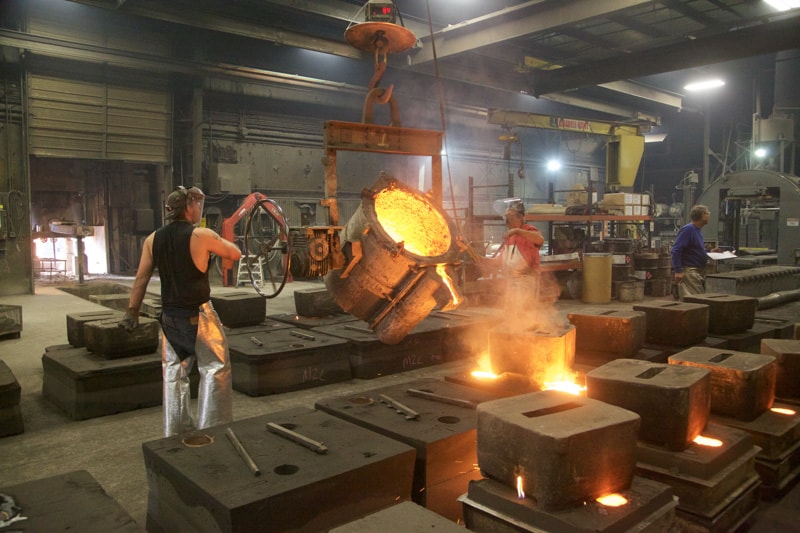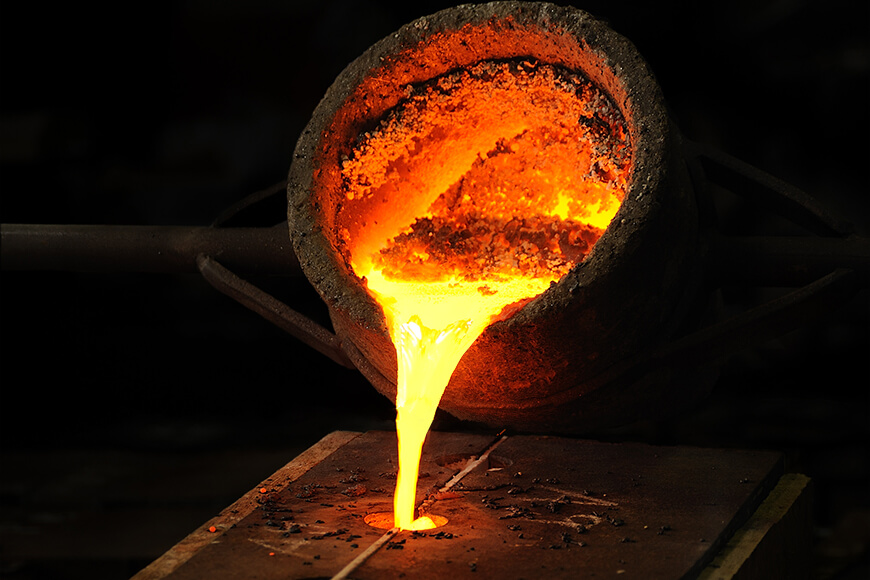The Complete Guide to Green Initiatives in Casting Foundry Workflows
Wiki Article
Discovering the Essential Duty of Casting Foundry in Modern Manufacturing
Casting foundries are crucial in modern-day manufacturing, giving crucial components throughout varied markets. Casting Foundry. Their capacity to produce complex, light-weight components fulfills the expanding needs for performance and quality. The landscape is evolving, affected by technical developments and sustainability problems. As these foundries navigate challenges and possibilities, their future role in manufacturing continues to be unsure. What strategies will they use to grow and adapt in this dynamic environment?The Basics of Casting: Comprehending the Refine
Although Casting has actually been an essential manufacturing procedure for centuries, its principles continue to be essential to modern-day industry. This process includes putting a liquid product, commonly steel, right into a mold and mildew to develop a certain form. The mold and mildew is created to form the wanted output, which strengthens as it cools down. Key stages in casting include pattern making, mold and mildew creation, pouring, and ending up. Each stage needs mindful focus to information, making sure that the last product fulfills quality and dimensional criteria.The flexibility of Casting enables for the manufacturing of complex geometries that would certainly be impossible or hard to accomplish through various other producing methods. In addition, Casting can suit a range of products, consisting of polymers and steels. This flexibility makes it a necessary technique for sectors ranging from automotive to aerospace, sustaining innovation and efficiency in the development of elements that fulfill the needs of modern applications.
Kinds of Casting Methods and Their Applications
Casting methods vary, each tailored for details applications and product demands. Sand Casting is among the earliest techniques, appropriate for complex geometries and large parts, making use of sand mold and mildews. Financial investment spreading, recognized for its accuracy, is ideal for detailed designs and is commonly made use of in aerospace and clinical industries. Pass away casting, often utilized for high-volume manufacturing, enables fast production of smaller sized components with excellent surface coating, commonly in aluminum or zinc alloys. Shell Casting provides a balance in between both, supplying fine details and good strength, making it preferred in automobile applications. Permanent mold casting, utilized for non-ferrous metals, supplies a tighter dimensional resistance and much better mechanical residential or commercial properties. Centrifugal Casting is efficient for producing round elements, typically found in pipelines and tubes. Each strategy offers distinctive purposes, underscoring the versatility and value of Casting in contemporary productionThe Influence of Casting Shops on Industry Advancement
As sectors venture for greater efficiency and product high quality, the role of casting shops becomes progressively crucial in driving development. These facilities act as the foundation for generating intricate components throughout various markets, including automobile, aerospace, and energy. By leveraging sophisticated Casting strategies and materials, factories add to the advancement of lighter, more powerful, and more durable items that satisfy evolving customer demands.
In addition, foundries help with the use of lasting practices, such as reusing metal and reducing waste, which straightens with modern industry criteria for ecological obligation. Ultimately, the ingenious abilities of casting foundries not just enhance producing performance however additionally drive entire industries into a future identified by technological advancement and sustainability.

Difficulties Facing Casting Shops in a Modern Economic situation
While advancement continues to improve the manufacturing landscape, casting factories encounter a myriad of challenges that endanger their functional viability. One significant issue is the boosting competition from advanced production modern technologies, such as additive manufacturing, which can produce complex get rid of much less material waste. Furthermore, the varying costs of resources, specifically steels, pose monetary dangers, impacting price predictability. Labor lacks better exacerbate these obstacles, as knowledgeable workers end up being harder to maintain and discover in the middle of an aging labor force. Furthermore, governing stress concerning emissions and work environment safety need foundries to buy pricey upgrades, frequently straining limited resources. The demand for electronic improvement additionally impends big, as many foundries battle to adopt Sector 4.0 technologies that improve performance and information monitoring. Collectively, these challenges force casting shops to adapt quickly or take the chance of obsolescence in a progressively affordable market.Sustainability Practices in Casting Foundries
Amidst the obstacles facing Casting foundries, the fostering of sustainability techniques has emerged as a necessary strategy for boosting look at these guys operational resilience and competition. Factories are significantly concentrating on lowering waste through reliable resource management, recycling scrap metal, and utilizing environment-friendly products in their procedures. The implementation of energy-efficient innovations is another critical aspect, as it helps reduced energy intake and carbon exhausts.Numerous foundries are taking on closed-loop systems to decrease water use and decrease the ecological effect of operations. Employee training in lasting practices fosters a culture of environmental responsibility, making certain that all staff member are participated in sustainability campaigns.
Integrating Technology in Casting Processes
Incorporating innovative technologies right into casting processes has become a critical element in driving effectiveness and development within foundries. Automation and robotics are progressively utilized to enhance manufacturing, decreasing labor expenses and reducing human error. Advanced software application for simulation and modeling permits designers to anticipate end results and optimize layouts prior to physical manufacturing begins. In addition, the unification of 3D printing technology significantly enhances the prototyping phase, helping with rapid advancement and decreasing preparations.On top of that, real-time monitoring systems making use of IoT gadgets enable shops to track performance metrics and recognize potential concerns early in the Casting process. This data-driven approach not only boosts high quality control however also supports upkeep strategies that avoid costly downtimes. Therefore, incorporating these modern technologies promotes a more dexterous manufacturing atmosphere, allowing shops to react rapidly to market demands while keeping high standards of quality and sustainability.
The Future of Casting Foundries in Manufacturing

The demand for high-performance and light-weight materials in markets like aerospace and vehicle will drive innovation within factories. Cooperations in between producers and factories will likely boost, fostering a more incorporated supply chain that stresses rapid prototyping and personalization. As electronic makeover continues, shops might also take advantage of information analytics to enhance operations and predict upkeep needs, making certain competition. Inevitably, the future of casting factories depends upon their capability to adjust to technological improvements and market needs while maintaining top quality and cost-effectiveness.
Often Asked Concerns
What Materials Are Commonly Utilized in Casting Foundries?
The products commonly used in casting factories include steels such as light weight aluminum, bronze, iron, and steel, in addition to numerous alloys. In addition, sand, material, and ceramic are commonly utilized for molds and core manufacturing.Just How Do Casting Factories Ensure High Quality Control in Production?
Casting shops implement strenuous quality control procedures, including normal evaluations, standard screening, and adherence to industry qualifications. These practices assure that each product satisfies defined resistances and performance criteria, therefore preserving high degrees of integrity and consumer complete satisfaction.What Are the Precaution in Casting Foundries?
Safety measures like this in casting factories include making use of individual protective equipment, proper ventilation systems, routine equipment maintenance, worker training programs, and adherence to security policies to decrease threats connected with liquified metal handling and equipment procedure.
The length of time Does the Casting Refine Typically Take?
The Casting procedure normally takes numerous hours to numerous days, relying on factors such as the complexity of the style, the products made use of, and the cooling time required for the cast elements to solidify correctly.What Is the Role of Engineers in Casting Foundries?
Engineers in casting shops manage layout, procedure optimization, and top quality control. They ensure that products meet requirements, troubleshoot production issues, and execute ingenious sites methods, eventually adding to effectiveness and the effective manufacture of metal components.Casting factories are essential in modern production, providing important components throughout varied industries. While innovation proceeds to reshape the manufacturing landscape, casting shops encounter a myriad of obstacles that intimidate their functional practicality. Amidst the difficulties confronting Casting factories, the adoption of sustainability practices has actually arised as a necessary technique for enhancing functional strength and competitiveness. In addition, real-time monitoring systems utilizing IoT tools enable foundries to track efficiency metrics and recognize prospective concerns early in the Casting procedure. The materials typically made use of in casting shops include steels such as aluminum, steel, bronze, and iron, along with numerous alloys.
Report this wiki page